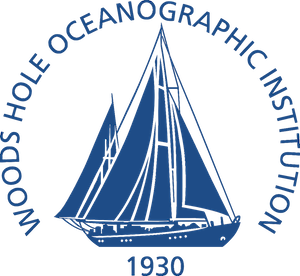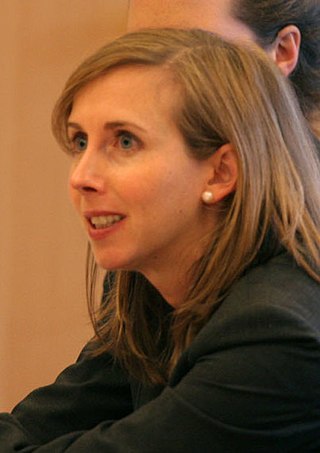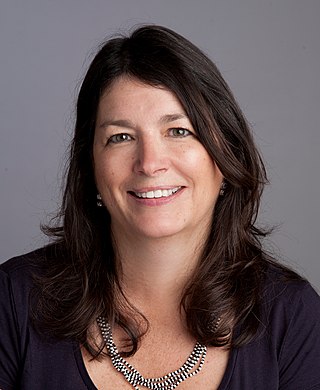
The Woods Hole Oceanographic Institution is a private, nonprofit research and higher education facility dedicated to the study of marine science and engineering.

Wallace "Wally" Smith Broecker was an American geochemist. He was the Newberry Professor in the Department of Earth and Environmental Sciences at Columbia University, a scientist at Columbia's Lamont–Doherty Earth Observatory and a sustainability fellow at Arizona State University. He developed the idea of a global "conveyor belt" linking the circulation of the global ocean and made major contributions to the science of the carbon cycle and the use of chemical tracers and isotope dating in oceanography. Broecker popularized the term "global warming". He received the Crafoord Prize and the Vetlesen Prize.

Marie Tharp was an American geologist and oceanographic cartographer. In the 1950s, she collaborated with geologist Bruce Heezen to produce the first scientific map of the Atlantic Ocean floor. Her cartography revealed a more detailed topography and multi-dimensional geographical landscape of the ocean bottom.
The Lamont–Doherty Earth Observatory (LDEO) is the scientific research center of the Columbia Climate School, and a unit of The Earth Institute at Columbia University. It focuses on climate and earth sciences and is located on a 189-acre campus in Palisades, New York, 18 miles (29 km) north of Manhattan on the Hudson River.
The Earth Institute is a research institute at Columbia University that was established in 1995. Its stated mission is to address complex issues facing the planet and its inhabitants, with a focus on sustainable development. With an interdisciplinary approach, this includes research in climate change, geology, global health, economics, management, agriculture, ecosystems, urbanization, energy, hazards, and water. The Earth Institute's activities are guided by the idea that science and technological tools that already exist could be applied to greatly improve conditions for the world's poor, while preserving the natural systems that support life on Earth.

Heidi M. Cullen is the Director of Communications and Strategic Initiatives at MBARI, the Monterey Bay Aquarium Research Institute. Cullen was previously the chief scientist for the non-profit environmental organization, Climate Central, located in Princeton, New Jersey. In addition, she is a guest lecturer at nearby Princeton University, and the author of the book, The Weather of the Future. An expert and commentator about issues related to climate change and the environment, she was an on-air personality at The Weather Channel, and is a senior research fellow at the University of Pennsylvania (Penn).
Lorraine Lisiecki is an American paleoclimatologist. She is a professor in the Department of Earth Sciences at the University of California, Santa Barbara. She has proposed a new analysis of the 100,000-year problem in the Milankovitch theory of climate change. She also created the analytical software behind the LR04, a "standard representation of the climate history of the last five million years".

Maureen E. "Mo" Raymo is an American paleoclimatologist and marine geologist. She is the Co-Founding Dean of the Columbia Climate School, Director of the Lamont–Doherty Earth Observatory of Columbia University, the G. Unger Vetlesen Professor of Earth & Environmental Sciences, and Director of the Lamont–Doherty Core Repository at the Lamont–Doherty Earth Observatory of Columbia University. She is the first female climate scientist and first female scientist to head the institution.
David T. Ho is an American scientist who works as a Professor at the University of Hawaii at Manoa. He is known for his work on air-sea gas transfer, mangrove carbon cycling, tracer oceanography, and ocean-based carbon dioxide removal (CDR). He is often quoted in the media on CDR and climate change, and was recommended by the New York Times as a climate scientist to follow on social media.

Robin Elizabeth Bell is Palisades Geophysical Institute (PGI) Lamont Research Professor at Columbia University's Lamont–Doherty Earth Observatory and a past President of the American Geophysical Union (AGU), 2019–2021. Dr. Bell was influential in co-ordinating the 2007 International Polar Year and was the first woman to chair the National Academy of Sciences Polar Research Board. She has made numerous important discoveries with regard to subglacial lakes and ice sheet dynamics, and has a ridge, called Bell Buttress, in Antarctica named after her.
The Center for Climate and Life is a multidisciplinary climate science research initiative based at Lamont–Doherty Earth Observatory (LDEO), a research unit of Columbia University. Center research focuses on how climate change affects access to basic resources such as food, water, shelter and energy. The center's founder and director is Peter B. de Menocal, a paleoclimatologist and Columbia University dean of science in the faculty of arts and sciences.
Tina van de Flierdt is a Professor of Isotope Geochemistry at Imperial College London.
Jessica E. Tierney (born 1982) is an American paleoclimatologist who has worked with geochemical proxies such as marine sediments, mud, and TEX86, to study past climate in East Africa. Her papers have been cited more than 2,500 times; her most cited work is Northern Hemisphere Controls on Tropical Southeast African Climate During the Past 60,000 Years. Tierney is currently an associate professor of geosciences and the Thomas R. Brown Distinguished Chair in Integrative Science at the University of Arizona and faculty affiliate in the University of Arizona School of Geography, Development and Environment Tierney is the first climatologist to win NSF's Alan T Waterman Award (2022) since its inception in 1975.

Andrea Dutton, a 2019 MacArthur Fellow, is a Professor of Geology in the Department of Geoscience at the University of Wisconsin–Madison where she studies paleoclimate, sedimentology, carbonate geochemistry, and paleoceonagraphy. Her primary research investigates sea level changes during interglacial periods to predict future sea level rise.
Kirsteen Jane Tinto is a glaciologist known for her research on the behavior and subglacial geology of the Greenland and Antarctic ice sheets.
Bärbel Hönisch is a German paleoceanographer and paleoclimatologist, author, and professor at Columbia University.
Jean Lynch-Stieglitz is a paleoceanographer known for her research on reconstructing changes in ocean circulation over the last 100,000 years.
Sidney Hemming is an analytical geochemist known for her work documenting Earth's history through analysis of sediments and sedimentary rocks. She is a professor of earth and environmental sciences at Columbia University.
Delia Wanda Oppo is an American scientist who works on paleoceanography where she focuses on past variations in water circulation and the subsequent impact on Earth's climate system. She was elected a fellow of the American Geophysical Union in 2014.
Zanna Chase is an ocean-going professor of chemical oceanography and paleoceanography at the Institute of Marine and Antarctic Science, University of Tasmania, Australia. She has undertaken over 20 voyages on research vessels, and her areas of expertise are Antarctic paleoclimate, marine carbon cycle, radionuclides in the ocean, sediment geochemistry, paleoceanography, and marine biogeochemistry. In 2013 she was awarded an ARC Future Fellowship.







